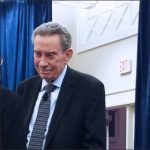On the eve of Halloween, the Center for Politics at the University of Virginia hosted an advance screening of Ball of Confusion: The 1968 Presidential Election. The documentary is slated to run on public television stations starting this month. It’s the latest project of Larry J. Sabato, a professor of American politics at the University of Virginia. He is also the longtime director of the UVa Center for Politics and he has won two Emmy Awards for previous documentaries.
Prior to turning down the lights, the politics professor interviewed Edward Nixon, who shares a strong resemblance to his late brother and the former U.S. President, Richard. As he took his seat, the 85-year-old raised his hands and gestured with the familiar victory signs. His field is in international commercial trade, a venture that has taken him to China on many occasions. Mr. Nixon spoke to the audience about the difficulties of growing up during the Great Depression. His family endured because their business was a grocery store; they helped their community by letting people do small jobs at the store in exchange for food.
Mr. Nixon, a geologist, confessed his “aversion to politics,” despite Richard’s efforts to persuade him to consider public office. He also admitted, “I regretted later not having an influence on [Richard] when he was in the White House.” Another Nixon family member who did not share such influence was Edward’s daughter, Beth. The eight-year-old girl sent her uncle a congratulatory letter, asking when she could move into the White House with him.
During the discussion, Professor Sabato described Ball of Confusion as a documentary that serves as a fitting “prelude to [the] 2016” elections. Indeed, the similarities are not hard to spot in the archival footage from ‘68: rioting in the streets, discontent over foreign policy, political infighting, and uncertainty. Turn your television to any major news network in 2015 and you’ll see those same topics in the headlines. Ball of Confusion also includes interviews with individuals such as Mary Frances Berry, George Wallace Jr., Pat Buchanan, Skip Humphrey, Walter Mondale, and others.

The presidential election contest was won by Richard M. Nixon, whose name has become synonymous with Watergate and Vietnam. Viewers are likely to be astounded as they watch and remember or learn about campaigns by Nixon’s opponents: segregation supporter George Wallace Sr. and Hubert Humphrey. Most surprising are perhaps the machinations of Lyndon B. Johnson, looming in the background with a “shadow” campaign despite his pledge not to run.
Because Ball of Confusion offers an honest perspective and focuses within a single year, there’s an opportunity to better understand the political divisions and social unrest of the time. It was a horrible year beset by tragedies like the assassinations of presidential candidate Robert F. Kennedy and civil rights activist Martin Luther King, Jr. As we approach 2016, maybe we can learn from the events of 1968 so that we might avoid (or pull ourselves out of) our own “ball of confusion.”
[amazon template=iframe image&asin=1620402807][amazon template=iframe image&asin=0802716830][amazon template=iframe image&asin=0133913309] Blogcritics The critical lens on today's culture & entertainment
Blogcritics The critical lens on today's culture & entertainment





At the time, I was still a few years away from voting age. VP Humphrey would have made a good president if he could have convinced people of a timely withdrawal from the Vietnam War. Former PTOS Nixon forced things with the Christmas bombing. He used far more force than was needed and created a lot of collateral damage. In the scheme of things, Vietnam ultimately embraced its own version of Asian capitalism so who really prevailed in the end?
PTOS Nixon should have reached out early to a number of outstanding people in his own party like Senators Jake Javits, Goodell and others. He could have put Gerald Ford on the White House staff from the start of his administration. PTOS Nixon never really believed that he was the president. He struck back even on small insignificant matters so that he could feel in control all of the time. Ultimately he paid a huge price emotionally, physically and in his stature before his fellow colleagues, the American people and the world.
Despite the difficulties in office, he managed to build a relationship with China, the Soviets and he orchestrated with Dr Kissinger an honorable withdrawal from Vietnam. (at least in his view) Years later, he did succeed in building a better relationship with the press and the American people. Future presidents invited him to the White House and he visited often on the popular talk shows.